Meanings of ISRAEL -
ישראל
“... Thy name shall be called no more Jacob, but Israel: for as a prince hast thou power with God and with men, and hast prevailed.”
(Genesis 32:28, KJV;
see also Hebrew/English Genesis 32:28)
It was the LDS Bible Dictionary that years ago prevailed on me to accept the definitions “Israel.
One who prevails with God or Let God prevail.”
Where do these definitions come from?
Apparently these definitions were chosen (asserted
really) from a comment in STRONG’S Hebrew Dictionary.
See entry 8280 on the verb “saw-raw’; a prim.
root; to prevail:- have power (as a prince). ”
In other words, those contributing to the LDS Bible Dictionary, conceived a
couple of meanings for Israel from “sarah” (שרה),
as uniquely interpreted in STRONG’S Hebrew note 8280. This they felt
good about, and published,
even though STRONG’S Concordance actually defines the name Israel differently (3478).
When one searches all instances of the Hebrew verb “sarah”
(Genesis 32:28,
Hosea 12:3,
Isaiah 9:6-7)
one struggles to find even one instance in which the verb is translated “prevail”.
If “sarah” means “to prevail” where is it used as such in the Bible?
The
verb “sarah” (שרה) can mean persist, persevere, wrestle, contend,
strive, struggle, exert oneself, exercise power, … but none of these guarantee prevailing, or explicitly mean prevail (i.e. be able, overcome, be victorious). In fact, the expression translated “and have prevailed” in
Genesis 32:28, comes from an entirely different word,
“yakhol” (יכל);
same as in
Genesis 32:25, and
Hosea 12:4.
If “sarah” means “to prevail”, then we have a potential redundancy in the verse: “... for as a prince hast thou
power prevailed with God and with men,
and hast prevailed.” This verse, Genesis 32:28, you will recognize
from above, is the verse explaining Jacob's new name
Israel (Yisra'El).
Of course the potential redundancy does not prove that “sarah”
can’t mean “prevail”. Given the meanings of “sarah”
(שרה) and “yakhol”
(יכל), we may see in the
same verse:
“... for as a prince hast thou power with God and with men, and hast prevailed
overpowered.” But as we look into the details of these two
Hebrew verbs, it comes as no surprise that prevail is absent in the
Brown-Driver-Briggs Lexicon definitions of
Yisra'El.
“El” in Yisra'El, is a reference to
mighty “God” (אל).
(Psalm 82:1)
The Most High God is “El-Elyon”,
who, of course prevails, and will prevail; though human beings are free to choose whether or not they will obey his
will.
(Psalm 82:1-8)
The question therefore isn't whether God will prevail, but whether he will
prevail more with justice, or more in mercy. (Isaiah 42:13,
LDS Doctrine and Covenants 3:3-14)
The word “sar” (שר)
means “prince”. The verb “sarar” (שרר)
should be considered. Especially consider the verb “sur” (שור) as used in
Judges 9:22
and Hosea 12:4.
One who is to reign and become a prince of God is suggested in the name
Yisra'El.
(Genesis 27:29;
35:10-11,
verse 11 in Hebrew)
The Hebrew letter yod
(י)
at the beginning of the name, indicates third person, masculine, possibly future
tense. So a direct interpretation of Yisra'El is:
He will strive (persist, contend, wrestle …) – El.
This is taken by some scholars to
mean God strives, persists, contends …
Other scholars like to make a command out of the name, and suggest the jussive
[Let] El persist,
persevere, contend, strive, wrestle, exert power, … But
there is really no explicit let in the name, and no
prevail appears in these scholarly interpretations, notwithstanding STRONG’S Hebrew
entry 8280 which asserts that “sarah” (שרה)
pronounced “saw-raw”, means “to prevail”.
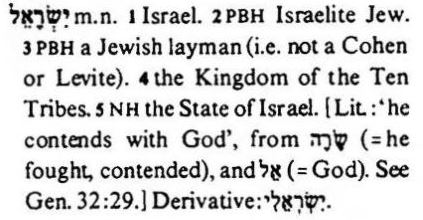
The meaning of Yisra'El
(ישראל) according to Ernest Klein.
A Comprehensive Etymological Dictionary of the Hebrew Language for Readers of English,
pg. 266.
Genesis 32:28
(KJV) corresponds to verse 29 in the Hebrew Bible.
What if Jacob had let the being he was wrestling prevail? Would Jacob have been blessed with the name
Israel? Scripture seems to indicate the answer is no!
Scripture explains:
24 Â And Jacob was left alone; and there
wrestled a man with him until the breaking of the day.
25 And when he saw that he (the man)
prevailed not against him
(Jacob), he touched the hollow of his (Jacob’s)
thigh; and the hollow of Jacob’s thigh was out of joint, as he
wrestled with him.
26 And he (the man) said, Let me go, for the day breaketh. And he
(Jacob) said, I will not let thee go, except thou bless me.
27 And he (the man) said unto him, What is thy name? And he said, Jacob.
28 And he (the man) said, Thy name shall be called no more Jacob, but Israel: for as a prince hast thou power with God and with men, and hast
prevailed.
(Genesis 32:24-28, KJV)
One of the reasons Jacob was blessed with a new name was because he prevailed. In fact,
verse 28
in Hebrew literally reads, “... va-tukhal”
(ותוכל) = “...
and thou hast prevailed”, meaning Jacob (Israel) had prevailed.
For Jacob to have been blessed with the name Israel, he had to prevail with that being that strove with him. How do we know this? The man
who blessed Jacob said so:
“Thy name shall be called … Israel: for … thou … hast prevailed.”
This does not mean that the verb prevail
is in the name Israel.
Suppose Israel can mean [Let] God prevail. Are we then to understand that Jacob was being reproved for prevailing when he was named
Israel? How else was Jacob to be blessed if not by prevailing?
Some blessings come by wrestling and prevailing with the Divine. Jewish faith understands this.
Consider
Genesis 30:8,
Exodus 32:9-14,
30-33,
Deuteronomy 9:18-19,
25-26,
Ezekiel 22:29-31,
Jacob 5:49-51,
1 Chronicles 5:2.
Note that God is not a mortal man that he should repent of doing wrong (as in sin, Numbers 23:19), but
the Eternal can change his mind, or be persuaded to change his mind
in righteousness.
(Genesis 19:17-22,
30,
Numbers 22:12,
20,
Jonah 3:10,
Isaiah 38:1-6,
Ezekiel 4:12-15,
Joel 2:13-14,
Helaman 10:11-12;
11:3-5,
14)
Why? Because God who is holy, is also a person or persons. To suggest that
there are no instances in which it may be appropriate to wrestle with God and prevail is contrary to scripture.
Genesis 32:28, LDS note
c actually admits that the verb in Israel means
persevere. The
Brown-Driver-Briggs-Gesenius Lexicon (1006/1197, pg. 975) definition of this verb agrees that it means
persevere, and no where states that it means prevail.
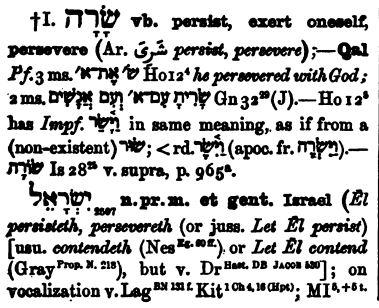
The verb “sarah”
(שרה) and the name “Yisra'El”
(ישראל) in
the
Brown-Driver-Briggs-Gesenius Hebrew-Aramaic Lexicon.
So how did
STRONG’S Exhaustive Concordance Hebrew entry 8280 come up with the idea that the root “sarah” in “Yisra'El”
means “to prevail”?
Let’s compare the language of entry 8280,
which asserts that the verb means “... to
prevail -- have power (as a prince)”,
with the unique language of KJV Genesis 32:28 which states: “as a prince hast thou power ... and hast prevailed”
(different than other translations).
See the similarity? One strong possibility is that what you see here, is an attempt to
fit a meaning to the verb in the name Israel
based on the venerable English translation of
verse 28; instead of more carefully discerning, and
rightly dividing the ancient language.
Besides Joshua (James) Seixas,
the Prophet Joseph Smith had few mortal Hebrew “experts” to consult
with. The Prophet had a copy of Seixas’ Hebrew primer, Manual Hebrew Grammar for the Use of Beginners. A Hebrew verb for “to be able,
prevail” is listed on
page 69.
This verb is the same as that discussed in STRONG’S Hebrew 3201.
This verb is not in the name Israel. Of course there is more than one
Hebrew verb that can be interpreted to mean “prevail”. Even so, Israel
may come short of prevailing. Israel needs God’s help and blessing.
(Exodus 17:11)
If the name Israel suggests the need for God to prevail in
hesed and in righteousness,
it may be precisely because the name Israel does not explicitly include the verb prevail.
So what is really a strong interpretation of the meaning of Yisra'El?
I believe
that if the Prophet Joseph Smith had openly, publically given us a definition of the meaning of
Israel it would have been a lot like the one found in STRONG’S Exhaustive Concordance
Hebrew entry 3478:
“…yis-raw-ale; … he will rule (as) God …”
This meaning of the name matches its use in the temple ordinances. With
El,
Israel rules as
Elohim. (Exodus 22:28;
7:1)
In fact, since “elohim” is masculine plural, and
parallels “anashim”, translated “men” in Genesis 32:28, the verse may be more properly translated:
“... Thy name shall be called no more Ya'aqov
(Jacob), but Yisra'El
(Israel): for as a prince
(שר as in שרית) hast thou
persevered (שרית) with gods and with men, and thou hast prevailed
(ותוכל).”
Note that the name Ya'aqov (Jacob) sounds a little like the Hebrew word for prevail, “yakhol” (יכל).
Scripture continues:
“And Ya'aqov
(Jacob) called the name of the place Peni'El (Peniel): for I have seen gods face to face, and my life is preserved.”
(Genesis 32:30; compare with Genesis 32:1)
Can the name Ya'aqov be interpreted to mean “he (Yah) will
supplant (prevail)”?
(Genesis 27:19,
36)
God with us (imanu El),
the House of ISRAEL (ישראל) becomes an eternal family (ישרון, spelled with a
“vav”
(ו) or sign of the
nail, and
a
“nun”
(ן) in
the place of
“El”;
Isaiah 44:2,
Joel 3:20-21,
Jeremiah 31:33-37,
1 Chronicles 22:10); unlike
“THE CHURCH OF THE LATTER DAY SAINTS”,
so named some years after
the 1830 restoration of the Church of Christ (LDS Doctrine and Covenants 20:1,
61,
70-71,
80-81).
Though the LDS Church has divine authority, she is nevertheless as her
title indicates, a temporally limited part of a hybrid or compound
church
(2 Nephi 2:11,
Ephesians 4:11-13); the eternal part being the Church of Jesus Christ, or rather, the
Assembly of
Yehoshua
ha-Mashiah, the
Firstborn.
(LDS Doctrine and Covenants 115:3-4;
128:21;
93:21-22)
Ages before
the Eternal called his
firstborn son out of Egypt
(Exodus 4:22-23;
4:22,
Hosea 11:1,
Matthew 2:15),
there were the sons of God(s), benei ha-Elohim
(Job 38:7),
foreordained to rule as God in the covenant body of
the Eternal Messiah,
Yeshurun.
(Abraham 3:22-28,
John 8:58,
Zechariah 12:8,
Genesis 3:15)
To
rule as God with God
(a meaning of
Israel), having power over the angels
(Hosea 12:4,
1 Corinthians 6:3,
LDS Doctrine and Covenants 132:20), is to have prevailed.
See Revelation 3:21;
5:5, where
nikaˇ means prevail, overcome, conquer.
The prophet Hosea understood the
princely significance of the name
Israel. Between
Hosea 12:3 and verse 4,
the prophet transitions from the verb “sarah” (שרה),
to the verb “sur” (שור)
in retelling the account of Jacob’s prevailing. The prophet cleverly,
though esoterically spells out the name Israel in verse 4. Consider the play on words
“yasar
el-” = “יָּ֤שַׂר
אֶל־” = “he had
princely power (ישר from שור)
towards (אֶל־)”.
The end of verse 3 and the beginning of
verse 4
may be directly translated:
“... he (Jacob) persevered
(שרה, had power)
with
gods: and he (Jacob) had
princely power (ישר from שור)
towards (אֶל־,
with, over)
a messenger, and he
(Isra-el)
prevailed
(יכל)...”
It may be argued that the verb rule, “sur” (שור),
which is related to persevere, “sarah” (שרה), implies prevail, “yakhol” (יכל).
Again consider Revelation 3:21,
which uses the Greek equivalent of
prevail,
nikaˇ and ties the prospect of ruling to prevailing.
In volume 3 of the
Koehler, Baumgartner Hebrew and Aramaic Lexicon (1996)
there are notes suggesting connections between “sarah” (שרה), and “sur” (שור), and the verb “sarar” (שרר)
which means bear rule:
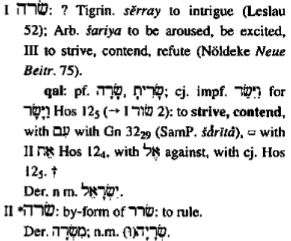
A second meaning of the verb “sarah”
(שרה),
as a form of “sarar” (שרר): “to rule”,
appears in
the Koehler, Baumgartner Hebrew and Aramaic Lexicon,
vol. 3, (453/463) pg. 1354.
See also the verb “sur”
(שור)
related to “sarah” (שרה), “to struggle, strive”,
and to “sarar” (שרר), “to rule over”
noted on pg. 1313 (412/463).
The numbering of verses in the Hebrew
Bible do not always match the KJV:
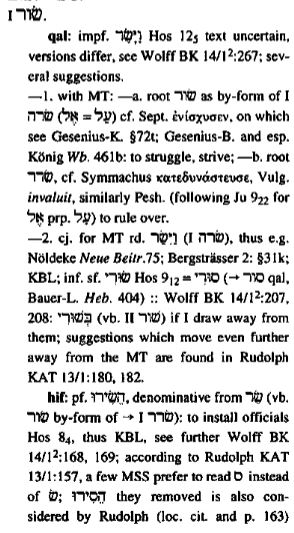
Koehler, Baumgartner Hebrew and Aramaic Lexicon,
vol. 3, (412/463) pg. 1313.
The verb “sarah” (שרה)
interpreted to mean rule, fits the meaning of
Yisra'El in the context revealed by Elohim in
Genesis 35:10-11;
wherein GOD announces that kings will come out of Jacob, Israel
will rule as El,
but El
Shadai implicitly prevails.
(Genesis 35:11,
Exodus 6:3, JST,
note c)
Like a cubic equation,
it may be acceptable for the name Yisra'El
(ישראל) to have more than one solution or interpretation:
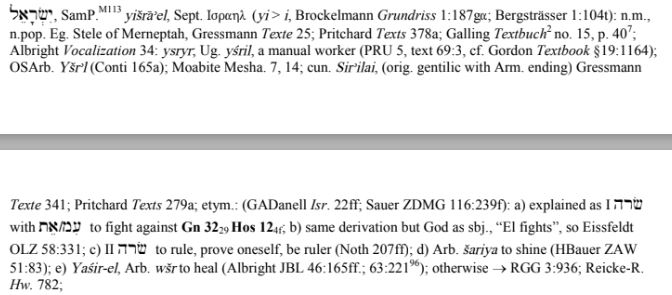
Above, are notes on meanings of Yisra'El
(ישראל) from the
Koehler, Baumgartner ... Hebrew and Aramaic Lexicon of the Old Testament
(1994-2000); supporting the interpretations: a) he fights (wrestles) God,
b) God fights, and c) he will rule (as/with) God.
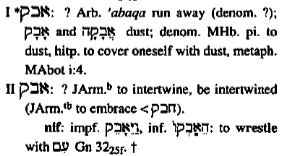
Notes on the root of the word translated “wrestled” in
Genesis 32:24 -25
from the
Koehler, Baumgartner Hebrew and Aramaic Lexicon,
vol. 1, (111/463) pg. 9.
The verb “avaq”, translated “wrestle” (אָבַק), is related to the noun “avaq” meaning “dust”
(אָבָק).
Evidently Jacob’s wrestle with the messenger was a literal dustup.
So its hard to give credence to the unscriptural image of a “man” with wings wrestling Jacob,
in as much as both
Jacob and the messenger went to the ground symbolically and literally - to the dust.
Curiously, the verb “avaq” may have a second meaning
entwined, as noted in the Lexicon above. The verb may also mean be intertwined, embrace.
The verb may either be related to, or a play on words with “havaq” (חָבַק).
(Genesis 33:4,
9-10, 10 in Hebrew)
Ancient Egyptian rites, and the Masonic five points of fellowship come
to mind. One may also perceive wordplay between “havaq” (חָבַק) and
“haver” (חָבֵר)
- companion.
There also seems to be a literary twist between Ya'aqov (Jacob,
he will supplant) and ye'aveq (he
will wrestle) in Genesis 32:24. Jacob’s wrestle with the man representing El
is real, as real as the injury Jacob receives. The text even conveys the
sense of
an intertwining embrace and rolling in the dust by the fact that it can be
challenging for the reader to tell who “he”, “him” and “his”
are - the wrestlers are so shrouded and intertwined.
(Genesis 32:25-26)
Inspired by the Genesis 35:10-11
account of Jacob being named Israel, not just by a god (one of the elohim, as in Genesis 32:28), but by El
Shadai the
Most High, we might also
come to see in the new name Israel, the message: “El (אל) rules!”
May
we then be excused in contriving a jussive
version: [Let] God rule (persist, prevail)? This should seem
imperfect to us, and beg the question: in what way can we let God rule (persist, prevail)? For
rule (persist, prevail) he will! The answer must be: we can
choose to let
God rule in our hearts, and in so doing, we may begin to rule as he.
Thus through “sarah” (שרה) meaning rule,
one
is able to make stronger an otherwise
weak interpretation of Israel.
(Ether 12:27)
But this interpretation of Yisra'El does not explain why he continued to go by the name
Ya'aqov (Jacob)
even after God had told
him that “Thy name is Jacob: thy name shall not be called any more Jacob, but Israel shall be thy name”. (Genesis 35:10;
46:2)
Perhaps it is because the meaning of Yisra'El, he will rule as El
could not be entirely fulfilled until he became
glorified and exalted in the presence of God.
In their presence, the Elohim no longer call him
Ya'aqov.
If you wish to read about the ancient meanings of each of the characters
spelling out the name Israel, click on the following letters
below
(read right to left):